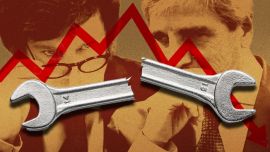President Javier Milei has said he will not set a new minimum wage in Argentina, despite soaring inflation running at more than 250 percent per annum.
The bullish La Libertad Avanza leader also predicted a “rebound" in Argentina's economy is on the cards – but only after an even "tougher" time ahead in the next two months.
"I don't believe that a politician can define a price by hand. I'm not even going to issue a decree setting a price," Milei declared Friday, as he was asked why the nation’s Consejo del Salario Mínimo (Minimum Wage Council) had failed to raise the minimum wage from its current value of 156,000 pesos (around US$177 at the official exchange rate).
The opposition-aligned CGT, Argentina's largest trade union umbrella grouping, has called for an 85 percent increase in the minimum wage but an agreement has not been reached with employers. Milei’s government has refused to legally set a new value unilaterally.
For Milei, a self-described "anarcho-capitalist," setting a minimum wage is "a question that has to be addressed by workers and employers," without state intervention.
On Friday, the government announced a 311 percent increase for the Asignación de Ayuda Escolar (School Help Allowance) payment that reaches 7.3 million children, whose families will now receive 70,000 pesos (US$79) to cover expenses needed for the start of the school year.
Since taking office last December, Milei has overseen a 50 percent devaluation of the peso, stripped away price controls and authorised large hikes for public transport fares, fuel and utilities such as gas and electricity, which will continue in the coming months as subsidies are removed.
Consumer prices rose 20.6 percent last month and year-on-year inflation is now running at 254.2 percent. The price of the basic food basket for a family of four is now 285,561 pesos (US$324.50), according to official data.
President Milei reaffirmed his government's economic course on Friday and predicted that within three months the country would begin to recover.
"You're going to do a sort of 'V,' a first section falling, with the hardest moment around March-April, which is when you hit rock bottom, and then you start to bounce back, and when you open the ‘cepo’ [currency controls in place since 2019], [and] the economy shoots forward," he argued.
Argentina has a US$44.5-billion credit programme with the International Monetary Fund, which had collapsed under the previous government and was revived by Milei upon taking office.
"The IMF estimates that if we continue to do this, we can clean up the Central Bank's balance sheet and open the cepo in the middle of the year," revealed Milei, who this week reaffirmed that his promise to dollarise Argentina’s economy is "ever closer" to becoming a reality.
– TIMES/AFP
























Comments